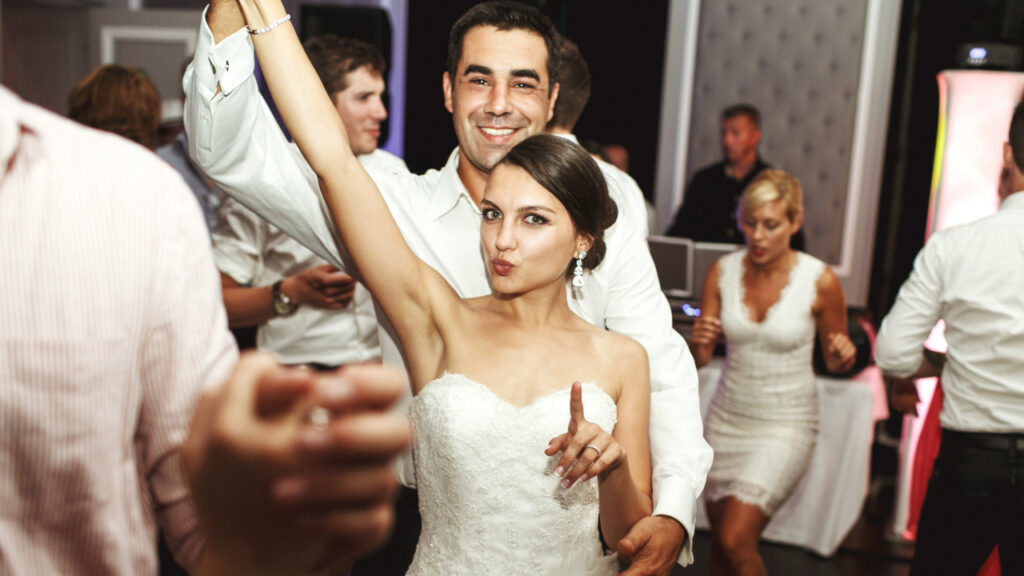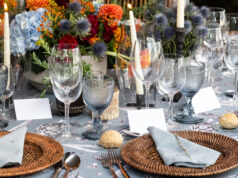Are you dreaming of saying « I do » amidst the enchanting backdrop of France, but feeling a bit daunted by the language barrier? You’re not alone. Planning a French wedding is an adventure filled with romance and charm, yet the thought of navigating through conversations and arrangements in a language you’re not fluent in can be intimidating. But fear not! This guide is here to help you tackle those language hurdles with ease, ensuring your bilingual wedding in France is as magical as you’ve always imagined.
From hiring bilingual vendors to embracing delightful French traditions, we’ll walk you through the essentials of overcoming language barriers. Whether it’s translating your vows or ensuring your guests feel included, we’ve got you covered. So, let’s dive in and make your French wedding dream a reality, language barriers and all!
▶️ Read also: Budgeting for your dream wedding in France
Understanding the importance of communication
Effective communication is key in any wedding planning, more so when it involves different languages. Misunderstandings can lead to logistical errors, cultural faux pas, and added stress. It’s crucial to acknowledge this early in the planning process and take proactive steps to mitigate potential issues.
Hiring bilingual vendors
When planning a French wedding, one of the smartest moves you can make is to hire bilingual vendors. This isn’t just about convenience; it’s about ensuring your vision for the big day gets translated accurately, both linguistically and culturally. Bilingual vendors are your bridge to the local scene – they understand your needs and can communicate them effectively to other local suppliers. This is particularly crucial for key roles like your wedding planner, photographer, and caterer.
Start by looking for a wedding planner who is fluent in both English and French. They will be your main point of contact and can coordinate all other services. Websites like The Knot and WeddingWire often list wedding planners who specialize in destination weddings and are likely to have bilingual professionals. For photographers, platforms like Fearless Photographers allow you to search for photographers by location, and you can then check their profiles for language skills. As for caterers, your wedding planner should be able to recommend local catering services that can accommodate bilingual needs.

Making the most of bilingual services
Once you have your bilingual team, it’s important to communicate your expectations clearly. Discuss with them how they will bridge the language gap on the day. For instance, will your wedding planner be present to translate speeches or toasts? How will your photographer give directions to guests for group photos? It’s also worth considering having bilingual staff for other key roles, such as the officiant or the DJ, to ensure all your guests feel included and engaged throughout the event.
Additionally, consider using bilingual websites and forums to find reviews and recommendations. Websites like Mariages.net (a French wedding planning site) and even expat forums can provide valuable insights into local vendors’ capabilities and experiences with international couples. Remember, the goal is to create a seamless experience, not just for you, but also for your guests, regardless of the language they speak. With the right bilingual vendors, your French wedding can be a harmonious blend of cultures and languages, making it an unforgettable experience for everyone involved.
▶️ Don’t miss: Legal considerations for getting married in France
Using technology to your advantage
In today’s digital age, technology can be a powerful ally in overcoming language barriers for your French wedding. One of the most straightforward tools at your disposal are translation apps. Apps like Google Translate or DeepL offer immediate text translation, which can be incredibly useful for quick translations of emails, menus, or even instructions from vendors. They can also assist in real-time conversations, although they may not always capture the nuances of cultural expressions perfectly. For more complex or formal communications, such as contracts or detailed discussions with vendors, these apps can provide a preliminary understanding before you seek professional translation.
Another technological solution is the use of language-specific wedding planning software or apps. These platforms are designed to cater to bilingual or multilingual wedding planning, offering features like dual-language wedding websites, RSVP tracking, and guest communication in multiple languages. Websites like Zola or Joy offer customizable wedding website templates that can support bilingual content, making it easier for you and your guests to navigate the wedding details in both English and French.
Embracing French wedding traditions
Incorporating French wedding traditions can add a unique charm to your ceremony. Understanding these customs is essential to appreciate their significance and ensure they are appropriately included.
Le Vin d’Honneur
« Le Vin d’Honneur, » a quintessential element in French weddings, is a tradition steeped in history and cultural significance. Historically, this event originated as a means to include the wider community in the wedding celebrations, even if they were not invited to the formal reception and dinner that followed. This practice reflects the communal and inclusive nature of French society, where weddings were seen as not just a union of two individuals but as a celebration involving the entire community.
Typically held immediately after the wedding ceremony, « Le Vin d’Honneur » is a cocktail hour that offers guests an assortment of drinks, including champagne and fine wines, along with light appetizers. It serves as an elegant interlude between the ceremony and the reception, allowing guests who might not be attending the latter to toast the newlyweds and offer their congratulations. This tradition underscores the French emphasis on hospitality and the importance of including a broader circle in the joyous occasion, making it a unique and cherished part of French wedding festivities.
La Piece Montée (the French Croquembouche)
« La Pièce Montée » is the crown jewel of French wedding desserts, a stunning and delicious confection that is much more than just a cake. It is a grand, architectural masterpiece traditionally made of profiteroles – small balls of choux pastry filled with sweet, creamy custard. These profiteroles are then piled into a high pyramid and bound together with threads of caramel, creating an impressive display. The ingredients typically include butter, flour, eggs, milk, water, and sugar, which come together to form the light and airy choux pastry and the rich, velvety filling. The caramel not only acts as a glue holding the structure together but also adds a delightful crunch and sweetness to the dessert.
For those interested in trying their hand at creating this iconic French dessert, there are numerous recipes available online. One such recipe can be found on The Spruce Eats, which provides a detailed step-by-step guide to making your own « La Pièce Montée » – aka the French Croquembouche. This recipe breaks down the complex process into manageable steps, making it possible for even amateur bakers to recreate this classic French showstopper. Whether you choose to make it yourself or leave it to the professionals, « La Pièce Montée » is a memorable and delectable part of any French wedding celebration.

Language etiquette during the ceremony and reception
The ceremony and reception are where language differences are most pronounced. Here are some tips to ensure a smooth experience for all guests:
Bilingual ceremonies
Bilingual ceremonies are a beautiful way to honor the union of two cultures in a French wedding, ensuring that both English (or other language, for us, Russian) and French-speaking guests feel included and engaged. In a bilingual ceremony, the officiant alternates between English and French, delivering each segment of the ceremony in both languages. This approach not only helps all guests follow the proceedings but also adds a layer of inclusivity and respect for both cultures. To implement this, it’s essential to find an officiant who is fluent in both languages and experienced in conducting bilingual ceremonies. They play a crucial role in setting the tone and ensuring the seamless flow of languages throughout the event.
In addition to the officiant’s role, couples can also provide printed materials, such as programs or vows, in both languages. This helps guests who are less fluent in one of the languages to follow along more comfortably. The programs can outline the order of the ceremony, explaining each tradition and its significance in both English and French. For the vows, couples might choose to say them once in each language or have a translation read out after each person speaks. This not only aids understanding but also adds a deeply personal and touching element to the ceremony, as each guest can appreciate the heartfelt promises in their native tongue.eption.
▶️ You may like: Tips for a chic and glamorous French wedding
Overcoming challenges with grace
Despite the best preparations, there may be unexpected language-related challenges. Here are ways to handle them gracefully:
Patience and understanding
In navigating a bilingual French wedding, patience and understanding are invaluable virtues. Language barriers can naturally lead to moments of confusion or miscommunication, and it’s important to approach these situations with a sense of calm and empathy. Whether it’s a vendor struggling to find the right English words, or guests from different linguistic backgrounds trying to interact, showing patience can ease any tension and foster a more inclusive atmosphere.
Understanding that perfection isn’t the goal, but rather the creation of a warm, welcoming environment where everyone feels valued and respected, is key. This mindset not only helps in smoothing over any linguistic hiccups but also enriches the overall experience, making the wedding a memorable celebration of love and unity in diversity. It’s about embracing the charm of a multicultural event, where every effort to communicate across language barriers is a testament to the bond and love shared by all involved.
Rely on visual cues
In a bilingual French wedding, visual cues can be a universal language, bridging gaps where words might fail. Simple gestures, like pointing or demonstrating, can effectively convey messages without the need for translation. For instance, during the reception, visual signals from the DJ or band can guide guests to the dance floor or signal important moments like the first dance. Table arrangements and seating plans displayed with clear, pictorial representations can help guests find their places effortlessly. Symbols or color-coded systems can also be used for different aspects of the event, such as distinguishing between vegetarian and non-vegetarian menu options.
Additionally, using visual aids like slideshows or videos during speeches can provide context and keep all guests engaged, regardless of their language proficiency. These non-verbal forms of communication are not only practical but add an element of universal appeal to the celebration, making it more inclusive and enjoyable for everyone.
Embracing the experience of a bilingual French wedding means fully immersing yourself in the unique blend of cultures and languages. It’s about seeing the beauty in the fusion of traditions and the charming moments that arise from linguistic diversity. Celebrate the small victories, like successfully navigating a conversation in French or seeing your families connect across language barriers. Take joy in the mix of languages around you, as it reflects the coming together of different worlds in your union. Remember, the occasional linguistic faux pas can add a touch of humor and humanity to your special day.
Most importantly, view any language challenges not as obstacles, but as opportunities to create a truly unique and memorable wedding experience that your guests will talk about for years to come.






